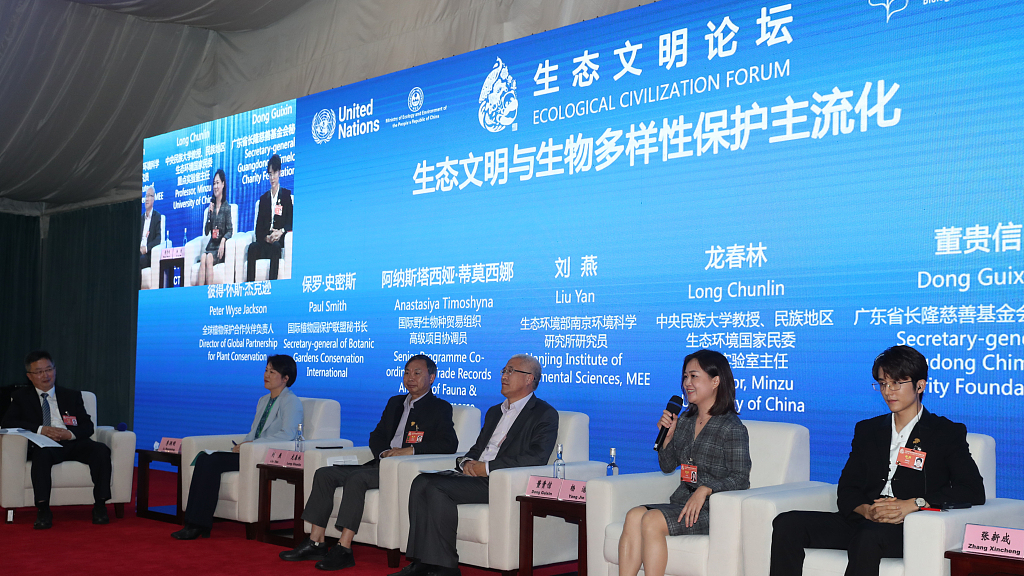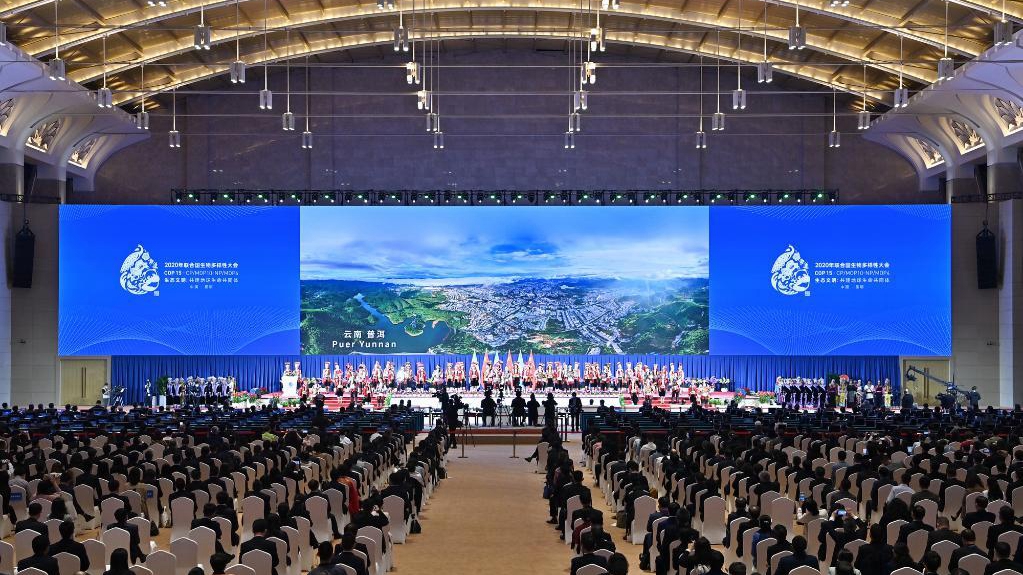
The Ecological Civilization Forum of the United Nations Conference on Biological Diversity held in Kunming, southwest China's Yunnan Province, Oct. 14, 2021. /CFP
The Ecological Civilization Forum of the United Nations Conference on Biological Diversity held in Kunming, southwest China's Yunnan Province, Oct. 14, 2021. /CFP
Editor's note: John Gong is a professor at the University of International Business and Economics (UIBE) in Beijing and a research fellow at the Academy of China Open Economy Studies at UIBE. The article reflects the author's opinions and not necessarily the views of CGTN.
The U.S. government is fond of touting "a rules-based international order" with its alliance with so called "like-minded countries," but with no reference to the most important established order as represented by the universally accepted United Nations. Nevertheless, on the issue of the environment, Washington runs out of like-minded countries, being on the exact opposite side of "a rules-based international order." Not a single ally; not a single like-minded country. Zippo!
I am talking about the Convention on Biological Diversity (CBD), a global initiative conceived at the United Nations Environment Program (UNEP) in 1988, dedicated to the goal of sustainability, conservation of biodiversity, and ultimately, we human beings' living in harmony with nature. This is essentially a UN-sanctioned international treaty to regulate the earthly aspects of environmental protection in addition to climate change.
Altogether 196 parties have signed this treaty, including all United Nations member states, but the United States has yet to ratify it. The Convention's governing body, called the Conference of the Parties (COP), is currently having its 15th meeting, COP15, in the city of Kunming in China.
The U.S. history with the CBD is one of an arduous journey. In fact, Washington is one of the original advocate countries that championed the idea of biodiversity in the 1980s, and U.S. diplomats used to be very much involved in the early CBD discussions, being influential in getting the effort off the ground in the early 1990s. But when the CBD treaty officially opened for signature in Rio de Janeiro, Brazil, in 1992, the political climate in Washington had already started to change.

The opening ceremony of the 15th meeting of the Conference of the Parties to the United Nations Convention on Biological Diversity (COP15) in Kunming, southwest China's Yunnan Province, Oct. 11, 2021. /Xinhua
The opening ceremony of the 15th meeting of the Conference of the Parties to the United Nations Convention on Biological Diversity (COP15) in Kunming, southwest China's Yunnan Province, Oct. 11, 2021. /Xinhua
President George H.W. Bush faced a close election in 1992, and this was a time when GOP constituents were increasingly complaining about U.S. sovereignty gradually losing ground to the UN and its internationalist, globalist "conspirators." Remember those stories back then about men in black from UN helicopters? So there was no reason for him to sign then.
But Bill Clinton won that year's election. In a move much hailed by progressives and conservationists, Clinton signed the CBD shortly after taking office. Nonetheless, the GOP caucus in the Senate put up a fierce fight to block the CBD's official ratification, led by the notorious Republican Senator Jesse Helms. It subsequently languished on the Senate floor without ever coming to a vote, and has continued languishing ever since.
The GOP's opposition to the CBD is based on mainly three reasons. There was a fear that U.S. biotech companies would have to share their intellectual property related to genetics with other countries, as the CBD has some clauses related to benefit sharing arising from the commercial utilization of genetic resources in a fair and equitable way. Then there is the money issue, the concern that the U.S. would be footing the bill for helping poorer countries to protect their natural resources. And finally those Trumpist climate-and-biodegradation deniers are still fiercely opposed to further environmental regulations.
Today none of these three reasons hold any water. Granted, the American bioengineering industry features some of the best and most cutting-edge companies, which have indeed generated many ground-breaking intellectual properties in this space. But the commercial interest issue can be negotiated and worked out in subsequent CBD working meetings as they are doing in Kunming.
As for money, today it is not just the United States that is footing all the bills. For example, Chinese President Xi Jinping just announced a few days ago that China is going to pitch in RMB 1.5 billion for the CBD cause. And lastly, loss of nature and species is as real as climate change, desperately in need of us humans to step up.
President Joe Biden cares about the environment as much as he cares about the climate. Right now progressives and Democrats are in control of both chambers of Congress. There has never been a better time to ratify the CBD than now. So take actions, Washington!
(If you want to contribute and have specific expertise, please contact us at opinions@cgtn.com.)

